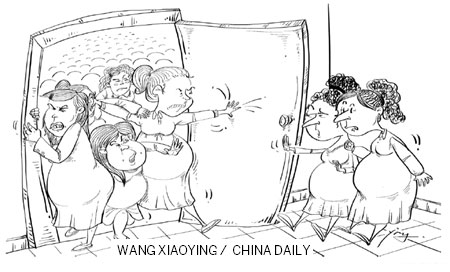To give or not to give birth abroad

An increasing number of Chinese women have been traveling overseas to give birth. They are doing so either to avoid paying the very high fine for having a second child in violation of the family planning policy or to get their children the citizenship of a country or region that does not have a tough exam-oriented education system like China's. The visa on arrival facility for Chinese in about 45 countries and regions, and the good education and medical treatment available at lower costs in quite a few regions seem to have made their job easier.
Normally, rich couples travel abroad to have a child, because only they can afford to pay the cost, which is about 100,000 yuan to 250,000 yuan ($16,460 to $41,150) in a developed country. But such people consider giving birth abroad as an "investment", for their children will not only get the citizenship but also can avail of the social welfare of the country or region of their birth. No wonder, giving birth abroad has become a fad among the rich in China.
The United States and Canada, followed by Australia, New Zealand and Hong Kong, are the most popular overseas destinations for women from the Chinese mainland to give birth because children born in these countries and regions automatically become their citizens.
However, social welfare, which includes comprehensive public service facilities, comfortable living conditions and good development prospects, seem to be the main reason why Chinese women are choosing to give birth overseas.
At the beginning of this century, many women from countries and regions like the Republic of Korea were traveling to the US to give birth to ensure that their children got US citizenship. But as these countries and regions developed economically and socially, the craze died down. Perhaps similar will be the case in China.
It is true that overseas Chinese play an important role in the development of China. But if more women choose to give birth abroad, they will not only lower China's birth rate further but also create social problems in their destination countries.
Chinese women giving birth abroad face many risks. First, there are no laws or regulations on Chinese women giving birth overseas and, according to reports, more than 90 percent of the domestic family planning agencies can't provide direct services to couples abroad and thus cannot sign valid service contracts with them. All this makes the child's "nationality" and "hukou" (house registration) difficult to ascertain.
Second, Chinese children who get other countries' and regions' nationalities may face difficulties when they return to China. Since they are not permanent residents of the Chinese mainland, they cannot enjoy social welfare such as education and medical treatment offered by the Chinese government. And their parents may have to pay huge amounts of money to raise them in China.
Besides, most Chinese children born overseas but growing up in China cannot enjoy the benefits and welfare of the countries of their birth. This means the children, despite being foreign citizens by birth, have to be raised in China. And if their parents want to send them back to their countries of birth after they grow up, they may face many social and cultural problems.
Third, going by the family planning policy, a couple could still be penalized even if their second or third child is born overseas. Some provinces have already issued regulations to penalize couples even if their second child is born abroad in violation of the family planning policy.
Fourth, childbirth-triggered immigration could lead to social conflicts in the places favored by Chinese mainland couples. Take Hong Kong as an example. The influx of mainland women giving birth in Hong Kong has left local residents worried about the depletion of the city's limited public resources and the great pressure it exerts on the education, healthcare and social welfare systems.
On the other hand, US citizens are most concerned about taxation. Many Americans think it's unfair for such children to enjoy the benefits of the US' public welfare after they gain adulthood and return to the country, because they are merely born in the US without their families paying taxes like other US citizens do. Besides, if the US were to amend the citizenship clauses in its Constitution, the future of such children would be uncertain.
Therefore, to reduce (if not to altogether end) the trend of Chinese mainland women giving birth overseas, Chinese authorities should strengthen the country's social welfare system and change the current family planning policy to benefit Chinese nationals.
The author is a professor at the Population Research Institute of Peking University.


















